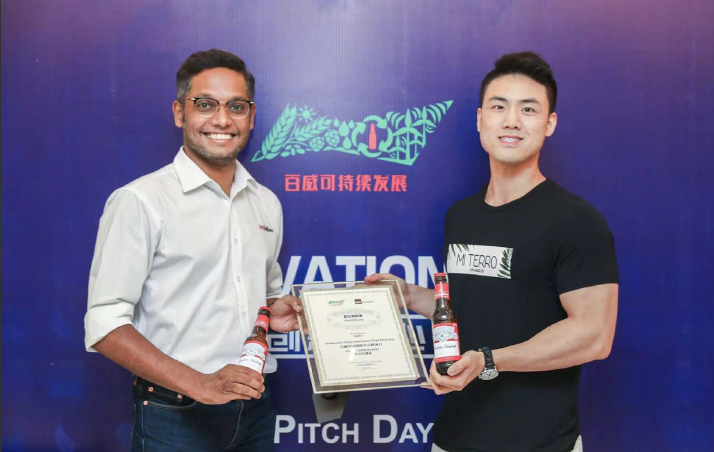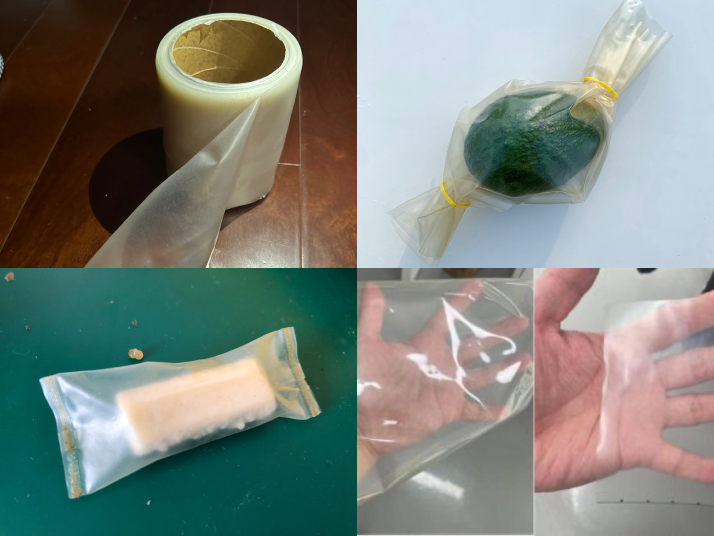
Following a stint at his uncle's farm in China's Qinghai Province in 2018, seeing the amount of milk, milk products and all dairy-processing wastes, Robert Luo began contemplating how to manage these surpluses. And so, that same year, he co-founded Mi Terro in the U.S., a company that originally intended to use milk waste for the creation of degradable textile fibers to make clothes.
"These clothes are soft to the skin and smooth to the touch," Luo told Beijing Review.
But his ambitions went well beyond fashion and today, Mi Terro has transformed itself into a biotechnology company that is revolutionizing the flexible packaging industry by making biodegradable materials from agricultural byproducts and surplus food, for example, potato peels and a distiller's spent grains.
A graduate of the University of Southern California's business administration degree program, 28-year-old Luo, who moved from China to the U.S. with his parents when he was 9, is passionate about entrepreneurship and its endless possibilities.
"In 2021, we established a subsidiary of Mi Terro in Hangzhou," the young Chinese entrepreneur said, adding that today they have a laboratory and a small production line in the eastern Chinese city in Zhejiang Province.
Delving deeper
Mi Terro aims to tackle two major environmental problems—food waste and plastic pollution, Luo explained.
According to the United Nations World Food Program, one third of all food produced for human consumption is lost or wasted globally. This amounts to some 1.3 billion tons per year, worth approximately $1 trillion. In addition, the petroleum-based plastic called polyvinyl alcohol, also referred to as PVA, is omnipresent in daily life—e.g., laundry detergent pods.
"This kind of plastic is designed to dissolve, but it doesn't necessarily disappear," Luo said.
A 2021 study published in the International Journal of Environmental Research and Public Health showed that while PVA does dissolve, it doesn't always biodegrade. The study suggested that over 75 percent of PVA persists in waterways and soil long after it dissolves in washing machines and dishwashers, flows through the wastewater and ultimately reenters the environment.
"Our biomaterials are 100-percent bio-based polymers (any of a class of natural or synthetic substances composed of very large molecules)," Luo said while holding up water-soluble compostable film during his video interview with Beijing Review. "After it's been used, this type of film can reenter our environment, without doing any damage," he added.
The company has teamed up with Anheuser-Busch InBev, the world's largest brewer, to recycle distiller's spent grains, and also works with Unilever, a British multinational consumer goods company, according to Luo.
"For instance, we produce the biomaterials for Unilever's sustainable laundry pod packaging," Luo said.
In recent years, many clothing companies have been advertising their use of recycled or sustainable materials, but very often these materials are combination fabrics—containing two or more types of fibers. These will pollute the environment once they enter the incinerator. "We need to solve the problem by delving deeper and going back to the origins—i.e., the actual materials," Luo said.
However, it's not easy for an eco-minded entrepreneur to manage a company; the daily challenges are rife, with one example being cost control. For example, when Luo first produced T-shirts made from milk waste, they would sell for about $50 apiece, far exceeding the price tag of the average shirt. And despite the already complex production process, the milk's protein content simply wasn't high enough to extract more textile fibers. Today, his company has shifted its focus.
Mi Terro has developed its own biodegradable, plant-based packaging film to replace single-use plastics and upgraded the related technology, making the company's biomaterials around 20-40 percent cheaper than other bio-based materials.
The commercialization of these biomaterials has not yet fully started and Luo has plans to develop a new production line this year to meet more market needs.

A Hangzhou home
China has announced it will peak its carbon dioxide emissions before 2030 and achieve carbon neutrality before 2060, generating great opportunities and new markets for sustainable and green development.
"We saw the country's supportive policies and cooperation opportunities [in this regard] and this was one of the reasons we decided to launch a Mi Terro branch in China," Luo said.
The decision to set up shop in Hangzhou was made because the city is home to Zhejiang University, one of China's leading research universities, and is also close to Shanghai, a megacity overflowing with high-caliber professionals.
And as a steadfast supporter of the country's medicine and e-commerce industries in recent years, Hangzhou now also favors the new material industry, according to Luo. "The city provides innovation-driven enterprises with office rent subsidies and other grants," he added.
To encourage enterprises to establish branches in Hangzhou and its development zones, the local government offers hi-tech firms tax breaks, with additional incentives for Internet startups, including housing subsidies for entrepreneurs and events to promote private and foreign investment to support startups, according to China Briefing, a U.S. news service about doing business in China.
According to Luo, China's environmental protection industries still need more time to thrive. The biodegradable material industry still largely invests in polylactic acid, a biodegradable as well as recyclable polyester made from renewable feedstock. "But we need to explore more options," Luo said, adding the Chinese market features much room for innovation.
He also suggested introducing new initiatives to encourage small and medium-sized enterprises and startups to innovate. "For example, we could launch more innovation and entrepreneurship competitions. Through these platforms, enterprises could promote their brands and attract more investment," he explained.
Luo further stressed how he hopes venture investors by large can give tech startups more time to develop before seeking to commercialize their innovations for profit.
Whereas China is set on protecting the environment, it might have different priorities at different stages. "Right now, the country's focus might be more on [clean] energy, but I think biodegradable materials have large market potential and can maybe thrive in coming years," Luo said.
"In my opinion, China's efforts in low-carbon and sustainable development will keep growing over the decades to come, and as more policy support emerges, related industries and markets can also continue their expansion," Luo concluded.
(Print Edition Title: Scaling Up the Strategy)
Copyedited by Elsbeth van Paridon
Comments to taoxing@cicgamericas.com